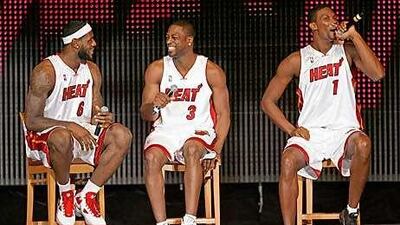In the summer of 1968, Wilt Chamberlain, the NBA's Most Valuable Player, was traded to the Los Angeles Lakers. He joined the perennial all-stars Jerry West and Elgin Baylor in what appeared to be an unbeatable troika of basketball talent.
Four seasons later, the Lakers won an NBA championship. In the summer of 2007, the former MVP Kevin Garnett and the all-star Ray Allen were traded to the Boston Celtics. They joined Paul Pierce in what appeared to be a peerless threesome. Ten months later, they won an NBA championship. Which example will LeBron James, Dwyane Wade and Chris Bosh more closely mirror now that they have joined to create another Big Three, this time with the Miami Heat? Will they need four seasons to manage a championship? Or will they be hoisting a trophy next June?
The basketball world is keen to find out. The issue would seem to revolve around three questions. Will one basketball be enough for James, Wade and Bosh? It will have to be; the NBA does not allow two. Or three. But this question is really about teamwork and self-denial, about sharing attention as well as the ball, because each individual is likely to see reductions in his statistics.
In the historical examples above, all six players involved in the new power trios saw declines in their points and rebounds per game. In some cases, significant declines. Chamberlain's scoring average fell from 24.3 points per game to 20.5. Pierce declined from 25.0 ppg to 19.6. Allen plummeted from 26.4 to 17.4. Even in a less-celebrated Big Three, that of Hakeem Olajuwon, Clyde Drexler and Charles Barkley, created in 1996 when Barkley joined the Houston Rockets as a free agent, the pattern did not change: all three scored fewer points. Barkley and Olajuwon were down almost 4.0 points per game.
James (29.7 ppg), Wade (26.6) and Bosh (24.0) were second, fifth and ninth in the NBA in scoring last season. History indicates they will lose 10-15 per cent of their points. No scoring championships here. Will these three mesh personally? Chamberlain, Baylor and West never were close, and it showed on the court. In fact, their 1972 championship came half a season after Baylor had retired.
Garnett, Allen and Pierce, however, seemed to bond immediately and establish roles: Garnett as the low-post scorer and defensive rock; Allen as the perimeter scorer; Pierce as a versatile defender and crunch-time scorer. James, Wade and Bosh claim to be close friends, going back to time spent together at the 2006 world championships in Japan. If so, jealousy over who takes the most shots will be minimised.
We are about to find out just how strong their friendships are. That they accepted almost identical contracts is a good sign; Chamberlain made almost three times as much as West, four decades ago. How much help will they have? This is perhaps the least-examined question whenever NBA celebrity threesomes have been assembled; the stars absorb almost all of the payroll and nearly all of the attention.
The Lakers trio from four decades back had solid supporting players in Johnny Egan and Keith Erickson. The Celtics group also had a nice blend of help, from the centre Kendrick Perkins to the point guard Rajon Rondo. The Rockets threesome had minimal help, in Mario Elie and Matt Maloney, which goes far in explain why they never won a championship together. The Heat trio join a roster that was wiped out to create salary-cap space to pay the elite free-agent stars. The Heat have only one player under contract, the guard Mario Chalmers. In the next two months, the club need to round up eight more players. It would be quite helpful if three or four are useful.
This is not the first Big Three. But it is unique in this sense: it is easily the youngest. Chamberlain, Baylor and West were 32, 30 and 34; Garnett, Allen and Pierce 32, 31 and 30. Olajuwon, Barkley and Drexler were 34, 33 and 34. James, Wade and Bosh are only 25, 28 and 26. Each should have his peak seasons ahead of him. If they can deal with surrendering a portion of the shots and attention they have enjoyed throughout their careers, and Heat management can find at least a few competent players to join them, they could be champions. Maybe not as instantly as those Celtics were, but sooner than the Lakers were. And, given their youth, they have a chance for much longer-lasting success than either group. @Email:poberjuerge@thenational.ae
1969 Los Angeles Lakers Adding Wilt Chamberlain to Jerry West and Elgin Baylor led to only slight improvement, from 52-30 to 55-27. The Lakers lost to the Celtics in seven games in the finals. 1983 Philadelphia 76ers Moses Malone joined Julius Erving and James Toney, and the team improved from 58-24 to 65-17 and defeated the Lakers for the title. 1997 Houston Rockets Adding Charles Barkley to Hakeem Olajuwon and Clyde Drexler helped the club from 48-34 to 57-25. They reached the conference finals; a year before they went out in the semi-finals. 2008 - Boston Celtics Paul Pierce was joined by Kevin Garnett and Ray Allen and the Celtics improved markedly from 24-58 to 66-16 and from out of the play-offs to NBA champions.

